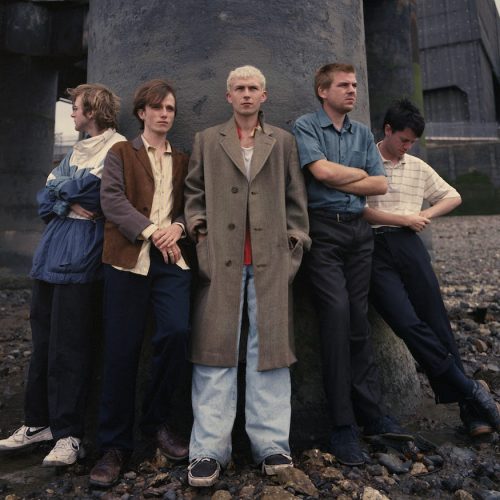If there is one style of music which I’ve never really been opposed to, yet never gone looking for, it would have to be spoken word. Regardless of the instrumentation or genre, I’ve always been really big on melodies in songs. In my journey of placing such a large emphasis on melodies as opposed to lyrics, I suppose you could say that I’ve largely just overlooked songs whose lyrics are spoken instead of sung. Even with that being said, most spoken songs that I’ve come across I’ve ended up enjoying. It’s almost as if it brings upon a different kind of appreciation for songwriting as an artform, placing more emphasis simultaneously on the instrumentation of the song as well as the stripped-down lyrical content. As of today, I can gladly add “Snow Day,” by Shame to the list of songs performed in this style which I genuinely enjoy.
Starting off sounding like a Radiohead song circa-2007, “Snow Day” quickly takes a turn towards the more energetic and overdriven side of the musical spectrum. A quick drumbeat, perfectly in time, pushes the song forward like a freight train as a guitar loops a riff on top. Then, without warning, the song begins welcoming an assortment of distorted and almost abrasive guitar sounds. As the vocals are introduced, most of the chaos of the track fades away, leaving just the bass and drums to provide a backdrop. Charlie Steen, the band’s lead singer, steps up to the microphone and begins talking over the beat, as opposed to singing. This style of music, combined with Steen’s delivery, immediately reminded me of Lou Reed. While the song nears a six-minute runtime, it certainly never drags on. While various sounds come and go throughout the track, there are multiple changes which almost make the song feel like three. During one change, everything slows down and gets even heavier as Steen screams his lyrics out. After a return to the song’s original pace, there is then another change towards the end which in a way combines the two styles. Throughout every change, the song only becomes more and more interesting.
Since the lyrical content of this song isn’t sung, but spoken, the words stand out with their message proudly on display. There isn’t much in the way of hiding obscure lyrics behind melodies, as speaking only gives you limited options when it comes to your delivery. By focusing on the imagery and visions in his head, Steen portrays a hopeless romantic in his daydreams about love. In one of the most poignant lyrics in the song, Steen delivers, “And everything comes together at once / It looks just like the ocean / And you wanna just dive in / It’s the most beautiful thing you’ll ever see / And yet you walk past it all the time / On your way to work.” Describing such vivid environments and then grounding them with his comments on this person simply walking by on their way to work do wonders at keeping the song relatable and impactful. Later in the song, Steen states, “And I’m not looking for anything / Well, not really / You see, I know what I need / I just haven’t got it yet.” This line is then followed with, “I just have to close my eyes / And then I fall to you.” Through these lyrics, which take no shortcuts, we can vividly imagine this scenario in our heads by the end of the song.
While pulling off a spoken-word track can be very hit or miss, since the emphasis switches heavily towards not only the backing instrumental but also the lyrical content. Without relying on catchy melodies to hide behind, everything comes up front and center. Thankfully, Shame has done a wonderful job with both of these elements. The best way to confirm this is to first imagine the song as an instrumental: It has multiple direction changes, is full of surprises and leaves you wanting more. Then, look to the lyrics without the music to back it up: read through the entire song and you’ll find that the lyrics read off much like a poem would, which also lends it to its spoken word nature. All in all, this song was a wonderful surprise from start to finish, and I am looking forward to Shame’s upcoming album to see what they do next.







